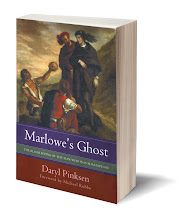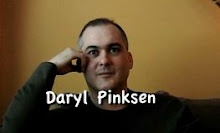Saturday, August 28, 2010
On the Nature of Evidence
Is there any evidence that Christopher Marlowe may have written the works of Shakespeare? It depends on the kind of evidence. I will say that there is no direct evidence for Marlowe’s authorship of the works of Shakespeare (and lots against him), and plenty of direct evidence for Shakespeare the Stratford shareholder (with little or none against him). However, I would also argue that there is indirect evidence for Marlowe, but agreement on how indirect evidence is interpreted depends on one's perspective and underlying assumptions.
Here's an example which demonstrates my point and also neatly discusses the early play Titus Andronicus, the idea of Shakespeare's apprenticeship, and the extent of the writer's education evident in the texts. In Jonathan Bate's "Shakespeare and Ovid", Bate discusses the adundant evidence of classicism in Titus Andronicus and compares it to similar evidence in Venus and Adonis:
"Muriel Bradrook has convincingly argued that Shakespeare wrote Venus and Adonis partly in response to Greene’s ‘upstart crow’ quip—the Stratford lad decided to show that he could outdo the Oxbridge men in that most sophisticated of genres, the Ovidian erotic narrative. Titus [Andronicus] is also beautified with the feather of classicism—and with a vengeance. If we posit an early date for the play we may consider it as a provocation for Greene; if a later one, as a response to him. . . "
Here's where it gets interesting . . .
"This then, is the additional force of Capell’s point: precisely because Shakespeare had less formal education than certain other dramatists, his play has more display of learning."1
Bate's conclusion may be true, but it is, nonetheless, circular reasoning. Bate illustrates the point that observations are weighed as potential evidence against initial assumptions. For example, I might take Bate's observation as indirect evidence that the writer of Titus had as much--or more--formal education than the other dramatists. But Bate sees it as indirect evidence of exactly the opposite: The fact that Titus is so thoroughly shot through with classicist veins -- not in a way which equals the university educated dramatists, but surpasses them - is interpreted by Bate as a psychological consequence (an inferiority complex?) of Shakespeare having less formal education, not as a natural consequence of its author actually having more formal education.
To paraphrase James Shapiro: in the rock, paper, scissors world of evidence, direct evidence (such as eye-witness testimony) trumps indirect evidence (like finger-prints). Shakespeare's name on the cover pages therefore trumps the presence of Marlowe's literary finger-prints all over the work.2
Daryl Pinksen
1 Bate, Jonathan. 1993. Shakespeare and Ovid. Oxford: Clarendon Press. p. 102
2 I also regard this observation as possible indirect evidence for Marlowe: "The fingerprints of Tamburlaine are all over the plays that are among Shakespeare’s earliest known ventures as a playwright." (Greenblatt, 2004, p.192). Greenblatt however would regard it as evidence that Shakespeare watched Tamburlaine over and over until he began, consciously and unconsciously, sounding like Marlowe in his own work.
Subscribe to:
Post Comments (Atom)





1 comment:
It seems to me, Daryl, that circular and contradictory reasoning are standard weapons of people arguing with their backs up against the wall.
Not so long ago, we were looking at some Beaumont's lines "proving" that Shakespeare was at his best when NOT displaying signs of education.
Amost anything can be turned into "evidence" on which to build one's own particular house of cards. Once the house is built, it is the house itself that becomes unshakeable evidence. I'm afraid we all do that sometimes.
That said, I'm afraid don't agree with your statement that we have plenty of evidence for WS as the author of the plays. We have plenty of proof that he was involved in the Company as a shareholder, some proof that he actually performed in minor roles, and almost no evidence that he ever did anything else.
Let's look at what we have: His name appeared as the author of 36 plays seven years after his death.
That might be conclusive evidence, except that:
Up to 1622 only 17 of those plays were published in 45 Quartos, of which 44 with his name (plus several anonymous ones such as Sir John Oldcastle, Locrine, etc). However, in 18 of those 45 Quartos his name was written as Shake-speare, which heavily suggests an alias
Also in reference to the name, the Shakes-peares Sonnets were dedicated by Thorpe to Our Ever-Living Poet in 1609, a year in which the presumed poet was very much alive. This fact also heavily suggest an alias.
And that's all. That's all the evidence that Stratford has; there is no other.
BTW, I think it's great that you've started this blog and look forward to see how it develops.
Post a Comment